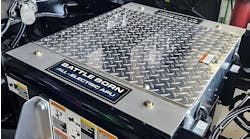Hauling dry vans down the highway offers plenty of opportunity to reduce fuel usage. But if your cargo is something less boxy, say automobiles, your aerodynamic options are more limited.
That’s the predicament in which Toyota Transport, part of Toyota Logistics Services, found itself. The fleet, with about 120 drivers and 91 tractors, moves Toyota, Lexus and Scion automobiles for Toyota Motor Corp. throughout the West Coast (it is on pace to transport 400,000 vehicles this year) from locations in Southern and Northern California; Portland, OR; and Phoenix, AZ.
Looking to reduce fleet emissions and improve fuel economy, Toyota Transport turned to Fleet Advantage. The lessor made a compelling case when it came to shorter lease cycles and newer equipment, but the additional advantages available from advanced driver and vehicle data sealed the deal.
“It came time to replace the trucks, and we looked at a number of leasing options,” says Kirk Welch, safety and compliance manager. “We found out about some of [Fleet Advantage’s] benefits. We started out with a five-year lifecycle with them, but they gave us an option to look at a three-year term.”
Welch says the fleet, which was running mostly pre-2007 emissions Freightliner and Sterling models up to 750,000 mi. per year, previously operated under a full-service lease arrangement. With Fleet Advantage, the decision was made to split the lease, leaving maintenance in the hands of the previous supplier but handing vehicle leasing to Fleet Advantage in 2013.
Welch says “Fleet Advantage gave us a more flexible solution” that includes access to more efficient technologies sooner through shorter lease cycles, emissions reduction technologies that were not on the prior vehicles, data analysis on fuel usage per vehicle and per driver, and driver behavior analysis.
The switchover took about six months, Welch says, but the results were immediate. “We saw about a 0.3 mpg improvement just in turning over the fleet, and we’ve seen another 0.2 mpg boost due to driver improvement,” he points out.
With data broken down by driver, the fleet has been able to increase its fleet-wide mpg average from around 5.4 before the 2013 switchover to 5.8 mpg recently. Welch hopes that with additional data and driver training, “we can get to 6 mpg.”
There was also a 10% reduction in CO2 and a 90% reduction in NOx and particulate matter with the new Peterbilt Model 365 day cabs. In addition, the vehicles were spec’d with automated transmissions.
Powered primarily by Cummins ISX 12 engines, the fleet is now saving $350,000 in fuel costs per year.
Toyota Transport has also ordered a compressed natural gas truck from Peterbilt. Powered by a Cummins Westport ISX12 G engine, the vehicle is currently getting its final facelift in Gainesville, GA, where Cottrell Trailers is installing the new headrack and trailer. According to Cottrell, the truck is the first CNG model converted to a car hauler by the company.


